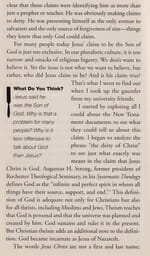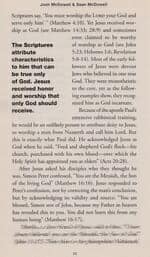Here is my intro to this story via my Facebook page for this site (added to just a tad):
A recent story has caught the attention of many in mainstream culture… but is starting to filter down to the myopic persons (like myself). It is this, that eve was not created from a rib ~ (really, something to do with Adams side — probably involving DNA, like adult stem-cells or something… bottom line is though, WE DON’T KNOW) ~ but from Adams penis bone (or, “baculum”).
I didn’t stutter. I said, Adams penis. While I can only imaging the furor and angry clambering across the gender feminist sub-culture (and smile inwardly at this writhing), I HAD to post on this topic.
“Enjoy.”
Another tidbit I learned from cruising the internet about this story is that an extinct walrus is known to have a 22-inch bacula. (The picture to the above/right is of a four-foot walrus bacula)
Keep dreaming boys!
When I first saw the below story… I thought the professor HAD to be a lib! Why? Because progressives have a tendency to sexualize e-v-e-r-y-t-h-i-n-g ~ which is why sex-education starts in kindergarten now. Anyhew, here is the “bulk” of the story via The Blaze:
A professor of the Bible in California has posed the theory that the Adam and Eve narrative in the book of Genesis was mistranslated and that Eve was created not out of Adam’s rib, but his baculum, or penis bone.
Ziony Zevit, a professor of biblical literature and Northwest Semitic languages at American Jewish University in California, recently presented his argument in an article in Biblical Archaeology Review based both on what he believes to be an erroneous translation for the Hebrew word for “rib” and also on the unique anatomy of the human male, one of the few mammals lacking a baculum.
He also pointed to the fact that men and women have the same number of ribs and that men have an even number of ribs, suggesting none are missing….
Using the logic from the story I have read… Adam had two??? But I digress… apparently, literally. However… my amateur musings aside, here is the logic of professor Zevit:
- A rib seems like an unlikely origin for Eve because male and female humans have the same number of ribs.
- Ribs also lack “intrinsic generative capacity”, which penises have “in practice, in mythology, and in the popular imagination”.
- Most mammals – and especially primates – have bacula, humans do not.
- It is therefore “probable” that Adam’s baculum was removed to make Eve, and not a rib.
The Hebrew is really just saying “from his side.” That is it. “a “rib” is just a cultural “guess” at what took place, but we really do not know.
So after hanging out at a friends house for his birthday, I mentioned that I think the professor mentioned in the story is liberal. [Plus, as a fan of Dennis Prager… I knew the odds were in my favor. See Prager’s “Explaining Jews, part V: Why are Jews liberal?“] So when I got home, I looked him up. This is his background:
- University of Southern CA, B.A. 1964
- University of California, Berkeley, M.A. 1967
- University of California, Berkeley, Can. Phil. 1970
- University of California, Berkeley, Ph.D. 1974
Um… Berkeley… in the seventies?
Bam!
I read an interesting article on Professor Zevit’s piece that I think was helpful. The article is entitled “A Flaccid Interpretation of Eden,” and is by Joseph Ryan Kelly. A very informative piece, I suggest reading it in its entirety.
…Novel interpretations like this one occur from time to time throughout Zevit’s re-reading of the second, third, and fourth chapters of Genesis. He maintains that Eden was a real location in the Armenian highlands somewhere west of Lake Van (Eastern Turkey), the most northern corner of the inhabited world known to ancient Israelites. Adam was not created from dust, light in color, dry, and loosely compacted. God formed him from apar, a “clod” which, like humans, is rich in constitution and ruddy in complexion. Following the transgression of the divine command — or the “oblique instruction,” as Zevit prefers for the grammatical informality of the command — God’s curses transform neither the bodies of the individuals involved nor their environment. Rather, as performative speech acts, they transform somewhat negatively how the serpent, “Hawwa” (Zevit refers to Eve by her Hebrew name), and Adam perceive an element of their lives.
Is Zevit just out to present novel, if philologically and historically sound, interpretations of the Garden of Eden? I asked myself this question with increasing frequency as I found it more and more difficult to hold together in my mind’s eye the picture of Eden Zevit was painting. What themes tie together a far northern location for Eden, creation out of clod, ossifical castration, and curses functioning as performative speech acts? This cacophony of novel (and sometimes not-so-novel) interpretations does not resolve harmoniously — at least not into the familiar narrative of sin and death that characterizes Western culture’s tradition of a fall. Zevit’s narrative becomes clear only near the end of the book. Forget sin and death; this is a story about human nature, the acquisition of knowledge, and ethical self-awareness. A story not about loss, but gain. Not a decline, but a rise.
It is unfortunate that Zevit’s chosen path of discovering what really happened in the Garden of Eden elides other interpretive paths explored in Western culture. He focuses exclusively on philology and historical criticism as tools of discovery, but during the Enlightenment a number of philosophers could not regard as purely sinful humankind’s acquisition of knowledge. They too cast aside notions of a fall. Immanuel Kant, for example, saw humankind’s pursuit as a positive step for the development of humankind, even if human actions introduced evil into the world. The first human couple discovers the freedom that constitutes the foundation of human morality. This freedom and capacity for moral discernment is fundamental to Kant’s deontological moral philosophy centered on the categorical imperative.
Philosophers of the twentieth century continued to acknowledge the merits and necessity of human freedom, although they were less enthusiastic about its implications. The circumstances of their own day — world wars and the threat of mutually assured destruction — made it increasingly difficult to remain generally optimistic about human freedom. What they discover in the Garden of Eden is not the origins of sin but an explanation of human sinfulness. The fall is less an experience in history and more the culmination of the creation of humankind.
Acknowledging that “knowledge is not foolproof,” Zevit’s interpretation otherwise lacks the sobering dimensions of this twentieth century philosophical interpretation. The Garden story is a “positive and optimistic one.” Immediately following the events in the Garden, human knowledge leads to the development of urban centers, pastoral nomadism, musical instruments, forged metal tools, and manufactured materials. Where other scholars tend to see an embedded critique of Mesopotamian civilization, Zevit sees only the human capacity to create knowledge. These implicit elements of critique aside, the flood and the confusion of languages at Babel explicitly reveal a darker side of human freedom. Readers of the biblical text, like philosophers of the twentieth century, are justified in recognizing that human freedom has its tragic consequences.
Has Zevit pulled back the curtain on these early chapters of Genesis? While his use of philology and historical criticism forces us to reconsider interpretations often taken for granted, his approach does not produce confident conclusions. Does God really create Hawwa, Eve, out of Adam’s penile bone? Genesis 2:21 describes God removing one ofAdam’s ribs or ṣelaot. To incorporate this detail into his interpretation, Zevit translates the term ṣela as “lateral bone.” Imagining the baculum as belonging to a category of lateral bones strikes me as a specious argument. But perhaps more pressing is the way this proposed etiology differs from other etiologies involving humans in the Hebrew Bible. Elsewhere, biblical texts use past events to explain cultural institutions or customs.
[…..]
What Zevit is proposing is altogether different. By removing Adam’s baculum and closing up the flesh, God forever changes physical features of the male anatomy. The eighteenth century French biologist Jean-Baptiste Lamarck thought organisms could transmit to their offspring characteristics they acquire during their lifetime. However interesting Zevit’s Lamarckian interpretation may be, it seems atypical among biblical etiologies, if not anachronistic. Do other etiologies in the Bible betray a belief in the inheritance of acquired traits? One does not readily come to mind. Moreover, it seems counterintuitive that Israelites would have believed one could inherit acquired characteristics given the regularity with which they circumcised male penises. Though not a coup de grâce, this thought raises a pressing question about an already tenuous interpretation.
The challenge of interpreting enigmatic details like this one exemplifies the problem inherent in trusting that the tools of our academic disciplines will guide us to some supposed real meaning of the biblical text. Claims about the authentic meaning of any biblical text function best as a marketing strategy — a means of attracting a broad customer base for discussions about textual and sometimes historical interpretation that may otherwise fail to produce intrigue among the general public.
I appreciate that Zevit has produced a book discouraging scholars and the general public from taking for granted the interpretation of this classic biblical text. However, I question the value of perpetuating the misconception that the object of interpretation is to discover the one real meaning of a text. If a text contained only one truly authentic meaning, it seems reasonable to assume such interpretations would have long since been realized. That scholars like Zevit continue to use the tools of their disciplines to construct different plausible historical interpretations of biblical texts should indicate not the inadequacy of their tools, but rather the inadequacy of such a limited understanding of textual meaning. Despite the interesting insights Zevit derives from his imaginative interpretation of Genesis 2-3 — or rather because of them — we are no closer to discovering what really happened in the Garden of Eden.
BTW, “baculum” (Latin) is part of a fallacy in logic:
Argumentum ad baculum is a fallacy in argumentation that is based on an appeal to force. For example, “You better believe what I say because if you don’t, I will beat you up.”






